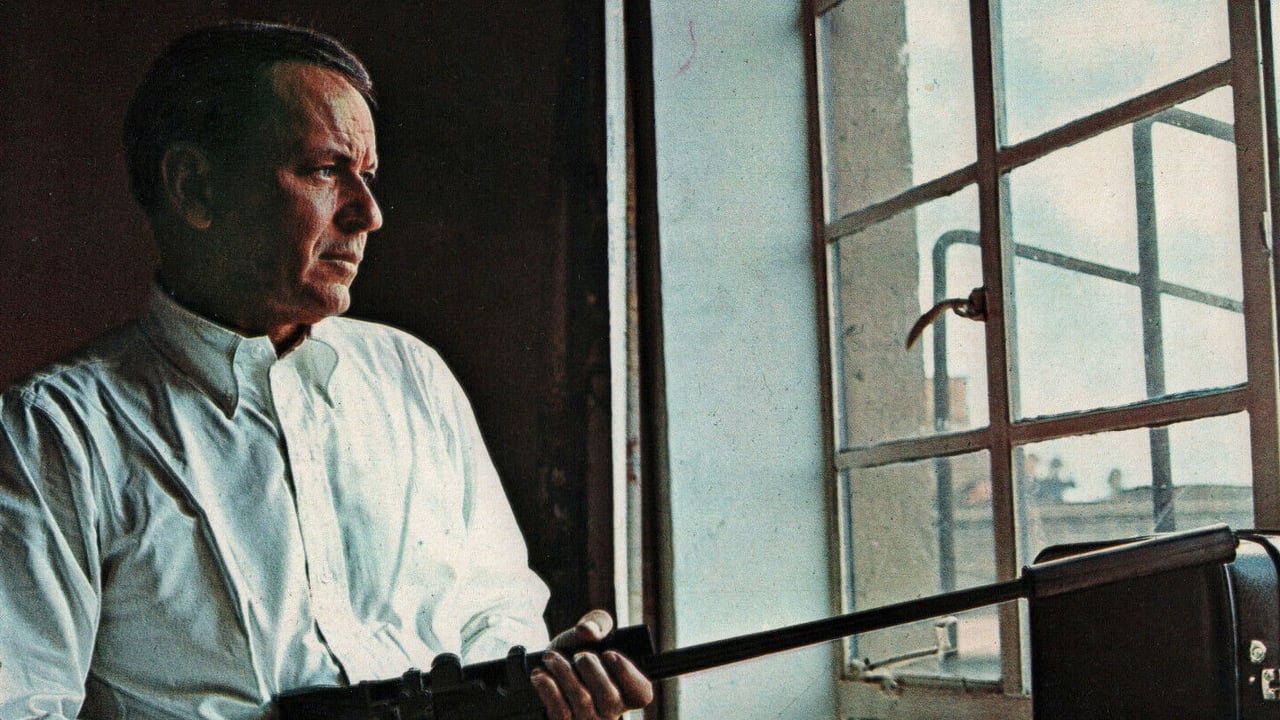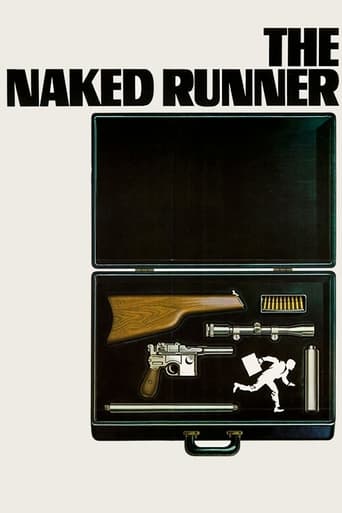

Tied for the best movie I have ever seen
... View MoreAn Exercise In Nonsense
... View MoreInstead, you get a movie that's enjoyable enough, but leaves you feeling like it could have been much, much more.
... View MoreThe film creates a perfect balance between action and depth of basic needs, in the midst of an infertile atmosphere.
... View MoreProduced by Brad Dexter. Copyright 31 December 1966 by Artanis Productions (a wholly-owned U.K. subsidiary of Frank Sinatra Enterprises). A Sinatra Enterprises Production. Released through Warner Bros. New York opening simultaneously at the Murray Hill and the Forum: 19 July 1967. U.K. release: 20 August 1967. Australian release: 30 November 1967. Running times: 104 minutes (USA), 102 minutes (UK), 101 minutes (including censor classification footage) (Aust).SYNOPSIS: Sam Laker (Frank Sinatra), an American widower who designs furniture in England, is planning to take his 14-year-old son, Patrick (Michael Newport), on a business trip to the Leipzig Fair behind the Iron Curtain. Before he leaves, Laker gets a call from a wartime buddy, Martin Slattery (Peter Vaughan), with whom Laker served in Special Operations in Germany. Slattery, who is with British Intelligence, wants Laker to deliver a message in Leipzig. Reluctantly, Laker agrees when Slattery says it will help Karen Gisevius (Nadia Gray), an underground member who had helped him during the war.Laker arrives in East Germany and makes contact with Karen. Upon returning to his hotel, he learns that his son has had an "accident" and is lured to a forest hideout where he meets Hartmann (Derren Nesbitt), a colonel in the East German State Security Service. COMMENT: Whatever happened to Sidney J. Furie? Once hailed as the brightest spark to hit British films in the 60s, his reputation has suffered a general eclipse. The problem of course is that Furie lost favor with the critics. "The Naked Runner" was roundly jeered at and counted out in every newspaper from Bangkok to Bourke. For once, both their lettered and unwashed readers agreed with editorial judgments. Despite a massive advertising campaign, "The Naked Runner" wound up as a large red-ink entry in Sinatra's accounts.Personally, I regard "The Naked Runner" as the best spy film to come out of England. Even more suspense, surprises and twists than "Pimpernel Smith" or "Night Train to Munich". Edge-of-the-seat excitement all the way, thanks to the inventive Sid Furie mixing in the Cold War and one of the finest supporting casts ever seen. Furie achieves most of his effects by editing rather than camera movement and his compositions are continually engrossing. The script is a model of gripping suspense. Only the final few seconds are a bit of a let-down. Otto Heller's brilliant cinematography, the fine sets and effective music score make a notable contribution to the film's success.OTHER VIEWS: I remember Peter Vaughan. It's 35 years since I've seen "The Naked Runner" but the ominously looming image of Peter Vaughan is firmly engraved on my memory. I've seen him in other parts, including the TV adaptation of Our Mutual Friend, but none of them made the same highly forceful impression. The same goes for Derren Nesbitt. Best part he ever played too. Exotic Nadia Gray has presence, as always. Though her part here is rather small, you can't forget her first encounter with Sinatra. While producer Frankie himself does a brilliant job of dramatic work as the harassed, "ordinary" businessman, worn down by and inextricably caught up in spiraling and hideous events over which he has no control. - JHR writing as George Addison.
... View MoreBased on Francis Clifford's novel of the same name, The Naked Runner is an obscure but creditable thriller, and a rarely seen entry in Frank Sinatra's filmography.To discuss the plot would be to spoil it so I won't do that. Suffice to say, furniture designer Sam Laker is pressured by a friend working for British Intelligence into doing a job in Leipzig to help an old wartime flame... but nothing is as it seems once he reaches East Germany. At that point we are firmly on Le Carre territory, with cross following double cross all the way to the end. And it is the end that is the problem; it cannot carry the weight of everything that has passed before.The reasons for this are fairly obvious: firstly, in the novel, the reader is as oblivious as Laker as to what is going on and greets every new plot twist with a frustration and incomprehension that Laker shares. This serves to heighten suspense at every level, and Laker's character becomes a fascinating comparison exercise with our own reactions as a reader. The writer of the film, Stanley Mann, chose to place the viewer firmly on the other side of the plot - so we know what is happening to Laker, and why. This serves to undermine him as a character, making him appear hapless, transient, and surly; that Sinatra plays him as such reflects, I think, that he understood as a performer that a narrative mistake had been made. Secondly, the ending is abrupt; indeed Laker's exclusion, you might almost say his quarantine, from the plot is solved by precisely five seconds of hurried dialogue over the end credits of the movie. This is a serious error of judgment that leaves the viewer with a profound sense of disappointment, which is why I've titled this review The Non-Nude Runner: I felt a little robbed.Apart from the botched ending it is an entertaining yarn. There are excellent performances by Peter Vaughn and Derren Nesbitt. Sinatra is very good too - his performance is low-key and it's obvious he had carefully studied the textbook performance for this kind of role; that of Richard Burton in The Spy Who Came In From The Cold.Recommended for fans of Sinatra, and followers of cold war thrillers. But make sure you read the book - it's excellent.
... View MoreThe film opens with a man's emotionless face in close up, enormously loud classical piano music and a phone ringing in the background. Is he listening to the music or is overlaid title music? This combination of intrusiveness and unclear purpose at the very opening of the film bodes badly for what follows. Sinatra, the world's finest singer of his time, was not a good actor but starry company and stirring plot buoyed up his performances. Here though he was with an unstarry made-for-TV cast with a convoluted plot and uninvolving characters where the task of carrying the film proved too much.Tribute should be paid to the career of its director Sydney J. Furie who appears to be still directing at the age of 85 following a career of 50 years including the brilliant Ipcress File, Lady Sings the Blues and a string of Cliff Richard vehicles early on. Slack deserves to be cut for him on The Naked Runner. As he acknowledged in his personal quote - not every film was a winner. Some definitely were, sadly not this one.
... View MoreFrank Sinatra seemed to be in a thriller mood during the mid-to-late 1960s: in fact, he did five such genre efforts in quick succession – beginning with the caper ASSAULT ON A QUEEN (1966; which I’ve lost more times on Italian TV than I care to remember!) and concluding with LADY IN CEMENT (1968; with which I’ll be ending my Sinatra marathon in tribute to the 10th anniversary of his passing).THE NAKED RUNNER (needless to say, the title is metaphorical) was different in that it was a British production and dealt in espionage (a heavy-going brand of thriller prevalent during the Cold War); in that respect, the film’s humorlessness is matched by the bleakness of its locations…but, unfortunately, the plot itself doesn’t ignite great involvement from the viewer either – so that director Furie’s trademark stylistics largely fall flat! Furie had just had a hit with the similar THE IPCRESS FILE (1965) – which started off Michael Caine’s Harry Palmer series of spy thrillers; that character was noted for being the antithesis of James Bond (obviously, the prototype of the secret agent) – being pretty much a normal ‘bloke’ as opposed to an invincible stud (incidentally, I’ve just acquired a couple of Matt Helm titles which actually follow the Bond mould and, curiously enough, star Sinatra’s old chum Dean Martin)! This one, then, goes even further by making its hero a complete outsider – not only having been out of practice for over twenty years but he’s also a foreigner (and a family man to boot!); thrust into a situation he can’t really grasp, rather than emerge as some kind of victor by the end of it, he realizes he’s been duped all along…and, just as cynically, the director cuts things off abruptly without so much as an explanation or an apology from his ‘employers’ or even a proper coda! Some have singled out this finale as being responsible for the film’s lack of popularity; however, as I said, it never really takes off and Sinatra himself seems uncomfortable within this environment – despite expert cinematography by Otto Heller (who lensed a good many films of this type) and a suitably melancholic score from Harry Sukman. Perhaps it needed a stronger female role than Nadia Gray, the Sinatra character’s old flame from the war years, who disappears after only a couple of brief scenes – and his son, too, is treated more than anything like a prop! That said, the supporting cast includes a number of dependable British actors who all pull their weight – even if their characters aren’t always clearly defined (another deliberate attitude common to spy stuff from this era): Peter Vaughn, Derren Nesbitt, Cyril Luckham and a young Edward Fox.Incidentally, the producer of this film was actor Brad Dexter, the least-known member of THE MAGNIFICENT SEVEN (1960); he was a personal friend of Sinatra’s whom he actually saved from drowning while filming Sinatra’s sole directorial stint, NONE BUT THE BRAVE (1965). I’ve recently come across conflicting reports on the reason why Sinatra severed his friendship with Dexter i.e. Sinatra didn’t want to be reminded of his indebtedness to Dexter or because Dexter tried to talk Sinatra out of marrying the much-younger Mia Farrow. Well, another valid reason could well have been because Dexter had saddled Sinatra with this lame thriller!!
... View More